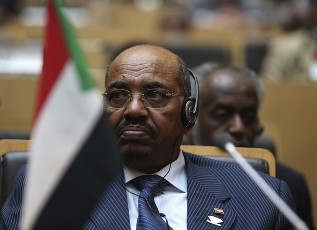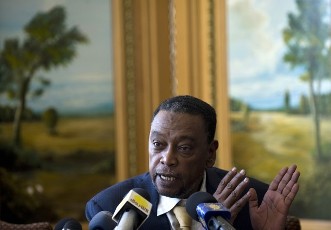Sudan hopes for breakthrough after Bashir agrees to release south’s oil tankers
January 28, 2012 (ADDIS ABABA) – The Sudanese president Omer Hassan al-Bashir heeded to a request from the Ethiopian Prime Minister Meles Zenawi and agreed to release three tankers carrying oil cargoes belonging to South Sudan that were held by Khartoum since earlier this month.

South Sudan president Salva Kiir was particularly concerned about the clause relating to oil tankers and as such Bashir ordered them freed immediately after consulting with his delegation and negotiating team.
“The vessels will be free to leave immediately,” al-Khateeb said.

On Friday, hopes of an agreement between Bashir and Kiir were dashed after South Sudan president expressed reservations about the proposal submitted by Thabo Mbeki who chairs the African Union High Level Implementation Panel (AUHIP).
In its watered-down form, the accord would allow South Sudan to export its oil without any portion of it being confiscated by Khartoum. The latter started last year seizing some of the crude pumped by Juba through the north’s pipelines claiming that it was payment in kind for transit fees.
South Sudan would then provide Sudan with the 35,000 barrels per day for its refineries in Khartoum and elsewhere.
The two sides would then work on the oil transit fee calculation and seek an agreement within a specific timeframe.
Th next round of negotiations is to resume on February 10th.
The two countries have been negotiating for months on what a fair charge should be for usage of the infrastructure by Juba to export its oil.
But as talks on the fees dragged on the Sudanese government said it ran out of patience and can no longer tolerate landlocked South Sudan exporting its oil for free. As such it started taking part of the oil pumped by South Sudan to make up for what it called unpaid fees.
In response, South Sudan said last week it was shutting down its oil output drawing concern by regional and international that tensions between both sides is escalating dramatically to the point where war could ensue.
Officials in Juba said they will not reverse their decision to suspend oil production unless Khartoum reimburses it for the “stolen” oil which they put it at close to 2 million barrels or $815 million.
Khartoum insists that it is simply it is taking what is owed to it by Juba for using its pipelines and refineries since South Sudan gained its independence last July.
“We started taking the equivalent in kind of what we had been invoicing South Sudan, not a cent more,” Al-Khateeb said.
Al-Khateeb said that Mbeki’s team would contact the two sides in order to set a date for signing the framework agreement which would pave the way for a final accord within 30 days.
“By taking this step, we expect the cover agreement to be signed, the shutdown to be halted, and the terms of the cover agreement to be respected,” said al-Khateeb.
“Before the end of today, we could be able to sign the cover agreement. We, at least, are ready to sign.”
A South Sudanese official, asked to comment, told Reuters: “We are studying the claim. We are waiting for confirmation from the shipping companies.” He did not want to be named.
Meanwhile the Sudanese negotiating team returned to Khartoum and upon arrival made remarks that were largely negative about their talks in Addis Ababa with South Sudan.
They also revealed that South Sudan attached other conditions in order to reach a deal including conceding Abyei along with five other disputed border areas.
Khartoum would also be required to give up any claims to its shares and rights in the branch of Sudapet Oil Company that operated in South Sudan.
“It is clear that the delegation of the South [Sudan] does not want to reach neither a temporary or permanent solution, having introduced two strange conditions which shows that the southern government has parties or pockets that do not want to reach an agreement with the [Sudanese] government to an agreement on this matter” said Al-Zubeir Mohamed al-Hassan who was a member of Sudan’s negotiating team and a former finance minister.
Al-Hassan warned that South Sudan has got more to lose than Sudan by shutting down oil production since it is dependent by 98% on crude exports for income. He accused Juba of seeking to topple the government in Khartoum through “strangling it economically”.
(ST)
